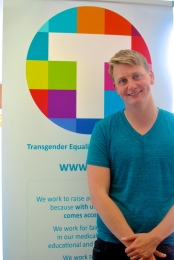Broden Giambrone of transgender support group Teni tells Lindsay Kopit about the challenges trans people face in Irish society.
Broden Giambrone was assigned as female at birth, but today he has been living as a man for nearly 10 years, after undergoing gender transition in his early 20s. After working in transgender communities in Canada, Giambrone moved to Ireland three years ago to take a position as the director of the national non-profit Transge-der Equality Network Ireland (Teni).

The Dublin-based organisation supports the rights and equality of transgender people. Teni focuses on education and raising awareness in Ireland about transgender – or ‘trans’ – issues and ensures that appropriate protections for trans people exist within the political and legal system.
Teni defines the term ‘transgender’ as relating to “a person whose gender identity is different than what was assigned or recorded at birth”. This encompasses people who have gone through sexual reassignment surgery, and also those who fall somewhere in between and perhaps do not identify exclusively as male or female.
“Trans people face high rates of isolation and discrimination,” says Giambrone, who adds that “the Irish State simply does not recognise that we are part of Irish society”.
In Ireland, he says, equality legislation is covered on eight grounds. But the rights of trans people are not explicitly covered on any grounds.
Lack of prioritisation
The members of Teni have collaborated with TDs and senators and spoken in front of many committees within the Oireachtas to fight for explicit protection of gender identity under law.
“There’s a lack of prioritisation,” says Giambrone, who notes that other human rights issues such as abortion have taken precedence. Meanwhile, Ireland has been found in breach of international and European human rights law for the State’s failure to allow people to be recognised for who they believe they are.
In Ireland, it is not possible for trans people to have their birth certificates changed. And although the possibility exists to change passports and driver’s licenses to reflect reassigned gender, it is quite limited due to certain ad hoc conditions.
“If people aren’t recognised by the State, many issues arise,” says Giambrone. “For example, if a trans person is trying to get their PPS number to work, they need to provide a birth certificate.
“People can end up in situations where you might have a passport as one gender and birth certificate as another, and you run the risk of being outed.”
Failure to obtain a new birth certificate is not the only human rights issue that trans people face under Irish law.
The Irish Government’s position on not allowing a married trans person to stay married is that it would result in a defacto same-sex marriage. In a country that doesn’t allow marriage equality – though LGBT campaigners and their supporters are pushing for change on this – the Government claims it would be against the Constitution.
In reality, Giambrone explains, it’s also against the Constitution to break up happy families. In its text, it pledges to protect the family, and also promises to protect marriages against attack. The grounds for divorce are explicitly stated in the Irish Constitution as well, demanding that the couple live apart for at least four years, and also have irreconcilable differences.
“Asking people to get divorced is infringing on their rights,” he says. “You’d have to go in front of the court and purge yourself. You’d be lying. It’s not a tenable solution.”
Teni has put forward legal arguments defending the right of trans people to stay married, arguing that certain countries that do not have marriage equality do actually allow trans people to stay married. Giambrone cited Austria and Germany as two examples.
While he acknowledges that the process is slow, Giambrone believes the social fabric will continue to evolve as people realise that trans issues are not so distant.
“It’s a useful tool to be thinking about how we all interact with gender and understand it,” he says. “The only way you change peoples’ minds is showing that we’re all kind of the same.
“We have different challenges and struggles and experiences but actually we’re not significantly different. Or scary. But it takes time.”











